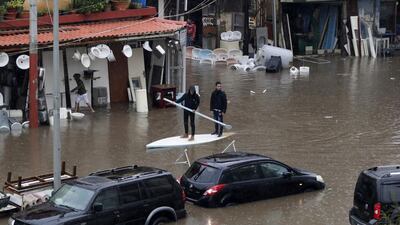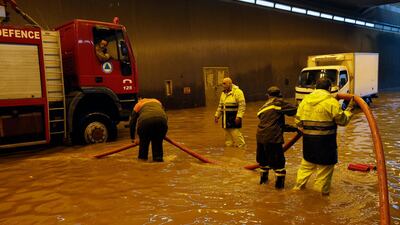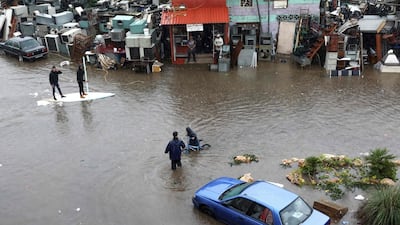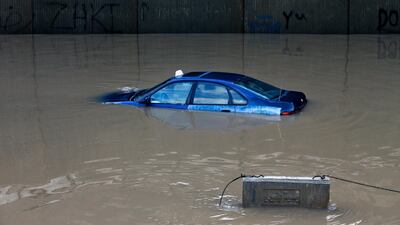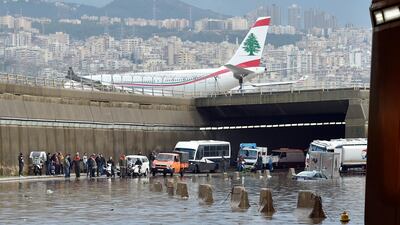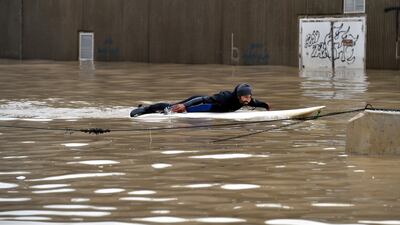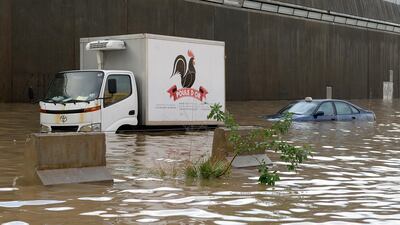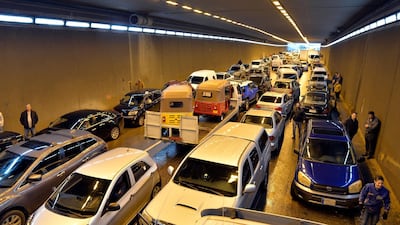Days after Lebanon was hit by severe flooding, the aftermath is hitting residents of one Beirut suburb hard. Amal, who runs a small furniture shop, was clearing out sodden stock on Tuesday morning after spending the morning cleaning.
“It’s all destroyed, we cannot sell anything,” she said.
Water reached levels of up to 1.2 metres in the neighbourhood of Sultan Ibrahim in the suburb of Jnah, South of Beirut, locals said.
Pictures of a man kayaking down the road between submerged cars went viral online on Monday, his preparedness a symbol of the inability of the Lebanese state to cater to its citizens minimum needs nearly three decades since the end of a bloody, 15-year long civil war.
The area floods every year but this time, the downpours coincided with mass anti-government protests, political paralysis and a financial crisis.
“Who will compensate us for our losses?” complained Amal, who asked for her name to be changed.
One of the poorest areas of Beirut located just a few hundred metres away from the Mediterranean Sea, Jnah is heavily controlled by Lebanon’s powerful Shiite party, Hezbollah and its local ally Amal
Officials have responded to the flooding as is expected by Lebanon’s citizens after major incidents. They blamed each other.
On Monday, the Ghobeiry municipality, which covers Jnah, said in a statement that it was not charged with upkeeping roads.
In a press conference, caretaker Minister of Public Works Youssef Fenianos said he accepted “full responsibility” for the floods, while at the same time pointing ou that his ministry was not receiving enough money to do its job because of the ongoing financial crisis. He also blamed a private company for a tunnel flooding near Beirut airport.
On Tuesday afternoon, the Parliament’s Public Works and Transport Committee held an emergency meeting in response. Its chair, MP Nazih Najem, promised that those responsible for the flooding would be prosecuted, "whether big or small".
But back in Jnah, locals were not convinced.
“It’s been like that for every year since I moved here in 1975,” said 58-year old Khaldeh Zein, the owner of a scrap metal shop. "It rains for five minutes and it floods. The area is low, close to the sea and water gathers here from neighbouring areas," he said.
He said that the protests that started on October 17 gave him no reason for optimism.
Sparked by a suggested tax increase, the protests rapidly morphed into a rejection of Lebanese politicians, accused of corruption and mismanagement, pushing Prime Minister Saad Hariri to resign on October 29. The country has been without a government ever since, despite the worsening economic crisis.
“The revolution cannot change anything. There are parties and mafias working on the ground,” said Mr Zein.
Politicians are widely perceived as corrupt in Lebanon, which ranks 138th out of 180 countries in Transparency International's latest corruption perception index.
In a street close to the shops, Mr Zein’s daughter had just finished washing the floor and hanging her carpets out to dry after her flat was flooded with a mixture of rain and sewage water.
Like her neighbours, she had built a 50-centimetre cement wall in front of her door, but this time, it was not enough to stop the water.
“We complained to the municipality. They sent us a plumber who said the whole lay-out is wrong and that everything must be broken and rebuilt. But the owner refuses,” said her neighbour, a Syrian woman, showing water dripping from her kitchen ceiling.
A few kilometres inland, Yazbeck Yazbeck, an employee at the neighbouring municipality of Naameh, blamed the flooding in his area on a badly-constructed artificial dam that had been sloppily supervised by public authorities.
“I am myself a politician. I’m 50 years old. I know how it works here. No pressure will change anything,” said Mr Yazbek, who is a member of the Free Patriotic Movement, a party that was founded by President Michel Aoun.
His wood workshop, in the basement of an unfinished building, was destroyed on Thursday by heavy rain. The interior walls even collapsed from the pressure of the incoming water.
“I need a month to clean this all up by myself. No one will help us,” he said, his face splattered with mud as he attempted to remove the detritus that had accumulated in his workshop and the floodwaters rushed in.
When The National drove up to the project that locals described as a dam, the gates were firmly shut. A sign read that it was an emergency waste treatment project supervised by the Council for Development and Reconstruction.
A New York Times investigation published earlier this month accused the council of corruption by awarding contracts to firms close to politicians in power.
In a memo leaked by Wikileaks in 2009, the then-Lebanon manager for the World Bank, Demba Ba, said his organisation was constantly fighting the council’s declarations that it “already had a contractor” for projects.
The firm was “usually someone either associated with the Prime Minister or whom the Prime Minister needs to compensate for a political or financial favour,” he said.

